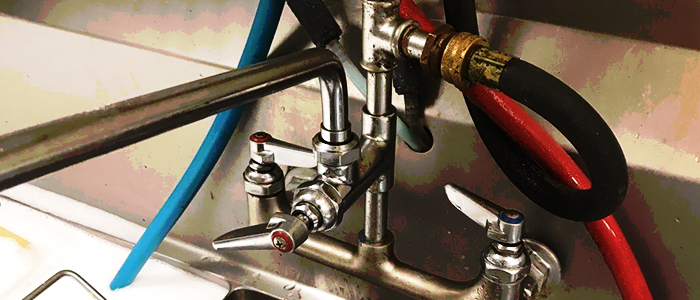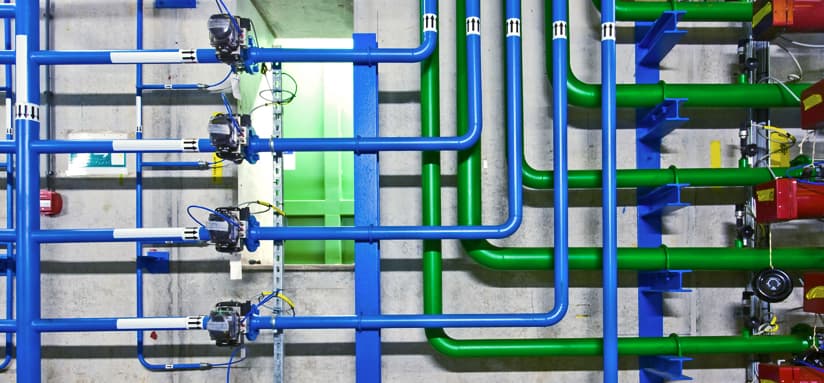Key Components of Your Home's Plumbing System
Key Components of Your Home's Plumbing System
Blog Article
On this page further down you will discover some good advice involving Plumbing Installation 101: All You Need to Know.

Comprehending how your home's plumbing system functions is necessary for each house owner. From supplying tidy water for drinking, cooking, and showering to securely getting rid of wastewater, a well-kept plumbing system is important for your family members's health and convenience. In this comprehensive guide, we'll check out the detailed network that comprises your home's plumbing and deal suggestions on upkeep, upgrades, and dealing with usual issues.
Intro
Your home's pipes system is more than just a network of pipelines; it's an intricate system that guarantees you have access to clean water and efficient wastewater elimination. Knowing its components and how they collaborate can assist you protect against costly repairs and guarantee everything runs smoothly.
Standard Elements of a Pipes System
Pipelines and Tubing
At the heart of your pipes system are the pipelines and tubing that carry water throughout your home. These can be made from different materials such as copper, PVC, or PEX, each with its advantages in regards to durability and cost-effectiveness.
Components: Sinks, Toilets, Showers, and so on.
Fixtures like sinks, toilets, showers, and bath tubs are where water is utilized in your home. Understanding exactly how these fixtures connect to the pipes system helps in detecting troubles and preparing upgrades.
Valves and Shut-off Factors
Shutoffs control the circulation of water in your pipes system. Shut-off valves are essential during emergency situations or when you require to make fixings, allowing you to isolate parts of the system without disrupting water flow to the entire house.
Water System
Key Water Line
The primary water line links your home to the local supply of water or a private well. It's where water enters your home and is dispersed to numerous fixtures.
Water Meter and Stress Regulatory Authority
The water meter steps your water usage, while a pressure regulator guarantees that water flows at a risk-free stress throughout your home's plumbing system, avoiding damage to pipelines and components.
Cold Water vs. Hot Water Lines
Recognizing the difference between cold water lines, which provide water directly from the major, and hot water lines, which bring warmed water from the hot water heater, assists in repairing and planning for upgrades.
Drain System
Drain Pipes Pipeline and Traps
Drain pipelines carry wastewater away from sinks, showers, and commodes to the sewer or sewage-disposal tank. Catches prevent drain gases from entering your home and likewise catch particles that could cause obstructions.
Air flow Pipelines
Air flow pipelines permit air right into the water drainage system, preventing suction that can reduce water drainage and cause traps to vacant. Correct ventilation is crucial for maintaining the integrity of your pipes system.
Relevance of Correct Drain
Making certain correct drainage stops backups and water damage. On a regular basis cleaning drains and keeping catches can prevent expensive repair work and prolong the life of your pipes system.
Water Heating System
Types of Water Heaters
Hot water heater can be tankless or typical tank-style. Tankless heaters heat water as needed, while containers store warmed water for immediate use.
Upgrading Your Pipes System
Reasons for Upgrading
Upgrading to water-efficient components or replacing old pipelines can enhance water quality, minimize water bills, and raise the value of your home.
Modern Plumbing Technologies and Their Benefits
Explore innovations like wise leakage detectors, water-saving bathrooms, and energy-efficient hot water heater that can save money and lower environmental impact.
Expense Factors To Consider and ROI
Determine the upfront costs versus lasting savings when thinking about plumbing upgrades. Numerous upgrades pay for themselves through reduced energy bills and fewer fixings.
Just How Water Heaters Connect to the Pipes System
Recognizing exactly how hot water heater connect to both the cold water supply and hot water circulation lines helps in identifying concerns like not enough warm water or leaks.
Upkeep Tips for Water Heaters
Frequently purging your water heater to eliminate debris, checking the temperature settings, and checking for leakages can extend its life expectancy and enhance power effectiveness.
Usual Pipes Problems
Leaks and Their Reasons
Leakages can occur because of maturing pipes, loosened fittings, or high water stress. Dealing with leaks without delay stops water damage and mold and mildew growth.
Obstructions and Obstructions
Clogs in drains and commodes are often triggered by flushing non-flushable things or a build-up of grease and hair. Using drainpipe displays and being mindful of what goes down your drains pipes can protect against blockages.
Indicators of Plumbing Troubles to Look For
Low water stress, sluggish drains pipes, foul odors, or uncommonly high water expenses are indicators of prospective pipes troubles that ought to be addressed immediately.
Plumbing Maintenance Tips
Routine Assessments and Checks
Schedule yearly plumbing evaluations to catch concerns early. Search for signs of leakages, corrosion, or mineral buildup in taps and showerheads.
Do It Yourself Upkeep Tasks
Simple tasks like cleaning faucet aerators, checking for commode leaks utilizing color tablets, or protecting exposed pipes in cool climates can prevent significant pipes concerns.
When to Call an Expert Plumbing Technician
Know when a plumbing problem calls for expert knowledge. Trying complex repairs without appropriate expertise can result in more damage and higher repair service expenses.
Tips for Decreasing Water Usage
Straightforward habits like fixing leakages without delay, taking shorter showers, and running complete tons of laundry and meals can preserve water and lower your utility expenses.
Eco-Friendly Pipes Options
Consider sustainable plumbing materials like bamboo for floor covering, which is durable and eco-friendly, or recycled glass for counter tops.
Emergency situation Preparedness
Steps to Take Throughout a Plumbing Emergency
Know where your shut-off valves lie and just how to switch off the water supply in case of a ruptured pipeline or major leakage.
Relevance of Having Emergency Contacts Convenient
Maintain call info for regional plumbing technicians or emergency situation services easily offered for fast response throughout a pipes dilemma.
Ecological Effect and Preservation
Water-Saving Fixtures and Appliances
Mounting low-flow taps, showerheads, and commodes can dramatically minimize water use without sacrificing performance.
DIY Emergency Situation Fixes (When Appropriate).
Short-term solutions like making use of air duct tape to spot a dripping pipe or placing a bucket under a trickling tap can lessen damage until a professional plumbing arrives.
Conclusion.
Understanding the composition of your home's plumbing system empowers you to keep it successfully, saving time and money on repairs. By adhering to routine maintenance routines and remaining educated regarding modern plumbing modern technologies, you can guarantee your plumbing system runs effectively for several years ahead.
HOW YOUR PLUMBING SYSTEM WORKS
Which Pipes Do What?
Blue lines = fresh water supply entering the building Red lines = hot water supply entering the building Grey lines = pipes carrying waste away from the building and venting pipes carrying gases away from the building (through the roof) YOUR MAIN PLUMBING SYSTEMS
There are two main plumbing systems that support your home s basic plumbing needs one that brings clean water into your home, and one that sends dirty water away from your home. Connected to the toilet, bath, shower, and other faucets in your home, these two systems keep your water flowing in the right directions.
ACCESSING FRESH WATER
Fresh and clean water is brought into your home through the main water supply line . Filtered through one pipe, this water is pressured to flow into the various fixtures in your home at any given time.
This water can be sourced from a well located on your property, a pond or river (mostly cottages), or, as in most cases, from the city s municipal water treatment centre. However, it is important to note that water that is untreated, such as the water siphoned from ponds or rivers, may not be safe to drink. Personal water supplies always need to be treated for hardness and contaminants before consumed.
MUNICIPAL WATER SUPPLIES
Improve taste and odour Remove sediment Eliminate hardness Reduce chlorine COLD WATER SUPPLY VS. HOT WATER SUPPLY
Cold water flows into your home or building through the service line, which then distributes hot or cold water to your fixtures. This line is most commonly run through a central column that runs floor to floor. Hot water runs in short and straight pipes as the longer the pipeline, the more heat that will be lost in the transfer. Having shorter pipes also allows residents to access hot water more quickly.
WASTE WATER SYSTEM
Your wastewater system is divided into two parts pipes that send wastewater away from your home and venting pipes that send sewer gas away from your home. Sewage water travels through pipes that flush the water and waste towards local sewers that are operated and managed by your city or town. Most sewer systems rely on gravity to move the wastewater to where it needs to go.
The further away from your toilet or sink, the larger wastewater pipes become. This allows for waste to be disposed of from various parts of your home or business at once without pipe blockages. The angle and flow of these pipes are also essential for keeping your waste pipes clear of build up.
https://harrisplumbing.ca/how-your-home-plumbing-system-works/

We were guided to that report on The Inner Workings of Your Home's Plumbing through a pal on a different domain. Are you aware of another individual who is involved in the subject? Why not promote it. We treasure reading our article about Exploring Your Homes Plumbing Anatomy.
Click On This Link Report this page